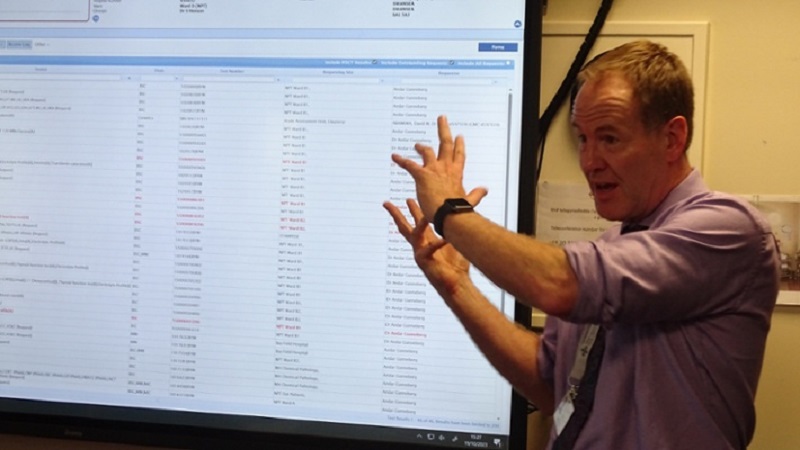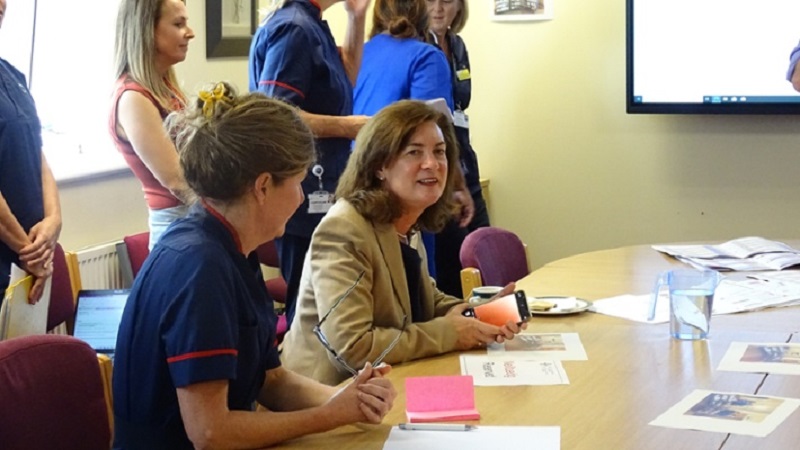On a visit to Neath Port Talbot Hospital in Wales, Welsh Health Minister, Eluned Morgan, saw firsthand how a new digital ward concept is transforming time-consuming documentation processes for staff and patients.
Key to this are two new digital systems which are being rolled out across Wales, the Welsh Nursing Care Record (WNCR) and Electronic Prescribing and Medicines Administration (EPMA).
They are saving time and improving efficiency, bolstering patient safety and quality of care, and saving money for health boards.
EPMA provides an electronic system for the prescribing and administering of medicines for patients in hospital.
In the Swansea Bay University Health Board area it has:
- Saved more than 2,000 hours of prescriber time each year from re-writing lost, missing, or full medication charts at Neath Port Talbot, and a further 3,600 hours a year at Singleton Hospital
- Reduced the time spent on individual drug rounds per nurse, per ward, by 10 minutes at Neath Port Talbot and by six minutes at Singleton
- Saved 3,300 nursing hours per year searching for medication charts at Neath Port Talbot and 5,600 hours per year at Singleton
- Significantly reduced errors associated with medicine prescribing and administration
All other health boards and trusts will start implementing the system from 1 April 2024.
The WNCR allows staff to record, share, and access patient information electronically across wards, hospital sites, and health board areas.
It has also standardised information collected about adults in hospitals, eliminating variation across regions.
The health board's director of digital, Matt John, explained some of the new digital systems now in place
All boards and most hospitals across Wales are now using the electronic nursing records, with the remainder set to come on board by March next year.
Signal is an excellent example of clinicians and digital professionals working together to deliver digital solutions that enable better care for our patients
One piece of research found that across the Cwm Taf Morgannwg University Health board area, between August 2021 and July 2023, WNCR saved 1,357,827 pieces of paper documentation – the equivalent of 135 trees. It also saw an estimated £1.66 less spent on printing per patient – resulting in annual savings of around £132,800.
Swansea Bay University Health Board has also developed its own electronic system for patient flow, called Signal, and this is further helping to improve patient safety and remove delays in patient care.
Signal keeps a digital eye on patients from their admission to hospital to their discharge and makes staff involved in their care aware of any support they need to leave hospital as soon as they can.
This includes details of a package of care they might need before they can return home.
The system is used across Swansea Bay to support online board rounds carried out by clinicians looking after patients.
And it means every member of the team involved in a patient’s care has the information available digitally, in real time, no matter where they may physically be.
Innovations such as this are exactly the sort of solutions we need to implement to ensure an NHS that is fit for the future
Signal also provides hospital management with an overview of what is going on in all the clinical areas and gives vital real-time information about capacity across all health board sites, helping to identify areas which may require additional support.
Morgan said: “The benefits of the new digital systems we are funding are clear to see.
“They are streamlining administrative processes for healthcare staff and allowing them more time to focus on patient care.
The Minister chatted to staff about the impact of the systems on patient care and operational efficiency
“As well as improving quality of care, they are also saving health boards money during extremely-challenging financial times.
“I am very pleased to see Swansea Bay has developed its own digital system to help speed up safe discharge from hospital, which is vital to improving flow through hospitals and cutting waiting times.
“Innovations such as this are exactly the sort of solutions we need to implement to ensure an NHS that is fit for the future.”
WNCR has transformed nursing in Wales by standardising documents and providing a digital solution in practice to enhance patient safety and experience
Matthew John, director of digital at Swansea Bay University Health Board, added: “Signal is an excellent example of clinicians and digital professionals working together to deliver digital solutions that enable better care for our patients.
“Clinicians in Swansea Bay are now able to identify critical information about their patients along with outstanding actions that need to be taken, in real time, from any device. This is eliminating administrative delays and blockages.”
And Fran Beadle, chief nursing information officer for Digital Health and Care Wales (DHCW) – which developed WNCR in partnership with all health boards and trusts in NHS Wales – said: “WNCR has transformed nursing in Wales by standardising documents and providing a digital solution in practice to enhance patient safety and experience.
“Collaboration, engagement, and listening to feedback from nursing staff has been the true success of this project.”
